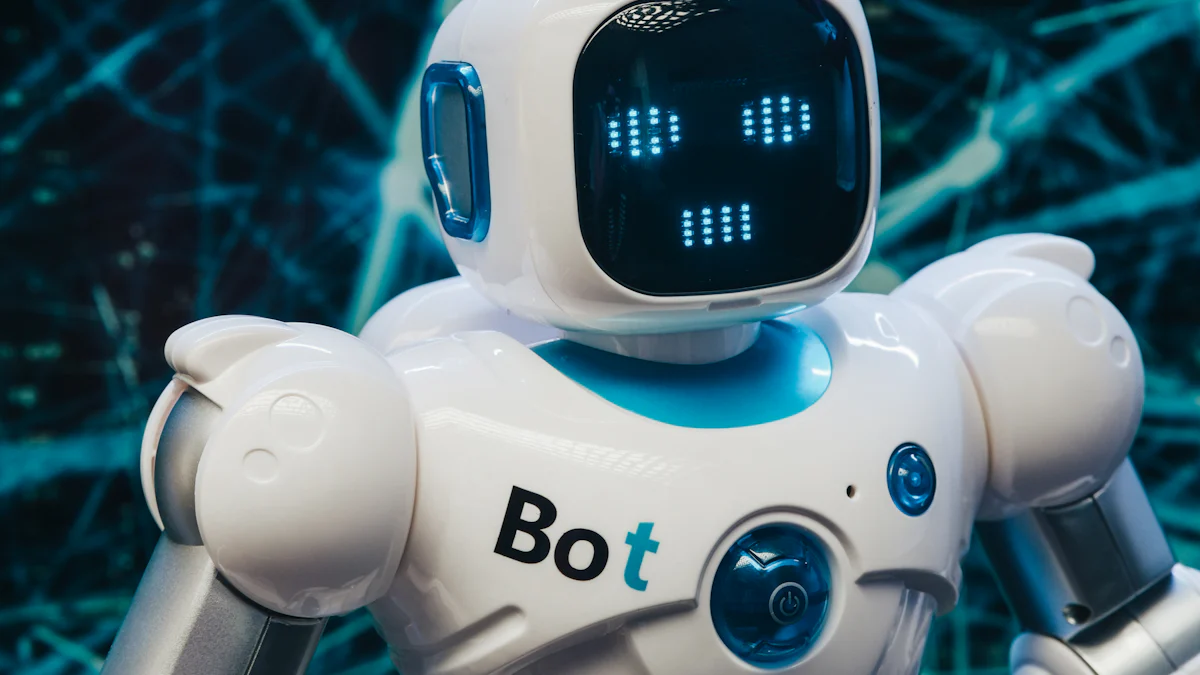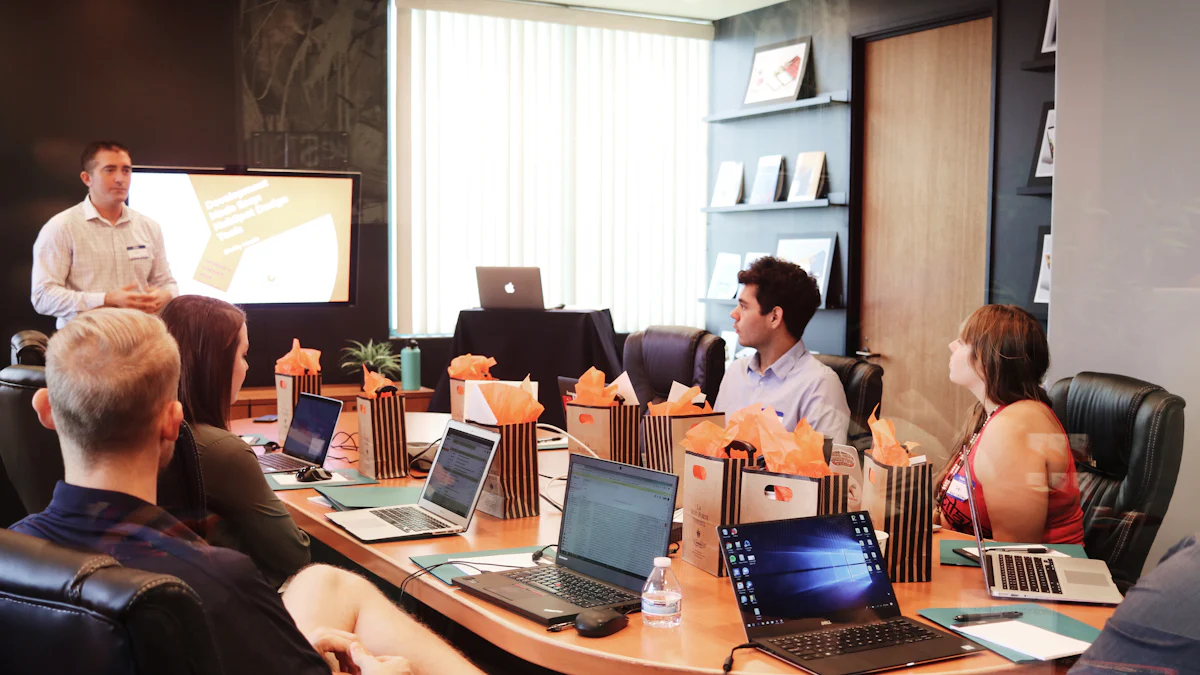AI Hiring Software: Key to Indonesia's Recruitment

In Indonesia, AI hiring software is transforming the recruitment landscape. This technology boosts efficiency by automating tasks like resume screening and interview scheduling. With AI, you can address talent shortages by identifying and attracting skilled candidates. It also promotes diversity by reducing bias in hiring decisions. Moreover, AI helps lower recruitment costs and adapts to local market needs. As a result, businesses can make better hiring decisions and improve productivity. The growing popularity of AI among students and workers highlights its importance in the evolving job market.
Efficiency and Speed in AI Hiring Software

In today's fast-paced job market, AI plays a crucial role in enhancing the efficiency of the recruitment process. By leveraging technology, you can streamline various tasks, making the hiring journey smoother and faster.
Streamlining Recruitment Processes
Automating Resume Screening
One of the most significant advantages of AI in HR is its ability to automate resume screening. Traditional methods often involve manually sifting through countless resumes, which can be time-consuming and prone to human error. With AI recruitment software, you can quickly scan and evaluate resumes, identifying the most suitable candidates based on predefined criteria. This automation not only saves time but also ensures a more objective assessment of applicants.
Scheduling Interviews
Scheduling interviews can be a logistical nightmare, especially when dealing with multiple candidates and interviewers. AI simplifies this process by automatically coordinating schedules, sending reminders, and even rescheduling if necessary. This feature allows you to focus on more strategic aspects of hiring, knowing that the administrative side is handled efficiently.
Reducing Time-to-Hire
Faster Candidate Evaluation
AI significantly reduces the time it takes to evaluate candidates. By analyzing vast amounts of data, AI can quickly assess a candidate's skills, experience, and potential fit for the role. This rapid evaluation process means you can move promising candidates through the pipeline faster, reducing the overall time-to-hire.
Quick Decision-Making
Incorporating AI into your HR strategy enables quicker decision-making. With access to comprehensive data and insights, you can make informed choices about which candidates to advance to the next stage. This enhanced recruitment efficiency not only speeds up the hiring process but also improves the quality of hires by ensuring that decisions are based on data rather than intuition.
By integrating AI into your HR practices, you can achieve enhanced recruitment efficiency and speed, ultimately leading to better candidate matching and more successful hires. As AI in HR continues to evolve, its impact on the recruitment process will only grow, making it an indispensable tool for modern businesses.
Overcoming Talent Shortages with AI
In the competitive job market, overcoming talent shortages is crucial. AI offers innovative solutions to identify and attract the right talent for your organization. By leveraging AI, you can enhance your recruitment strategies and build a robust talent pool.
Identifying and Attracting Talent
Leveraging AI for Talent Mapping
AI recruitment tools excel in talent mapping. These tools analyze vast amounts of data to identify potential candidates who match your job requirements. By using AI, you can pinpoint individuals with the right skills and experience, even if they are not actively seeking new opportunities. This approach ensures that you have access to a broader range of candidates, increasing your chances of finding the perfect fit for your organization.
Engaging Passive Candidates
Engaging passive candidates becomes easier with AI. Many talented individuals may not be actively looking for a job but could be open to new opportunities. AI recruitment software can identify these candidates by analyzing their online presence and professional networks. By reaching out to passive candidates, you can expand your talent pool and find individuals who might not have applied through traditional channels.
Enhancing Talent Pools
Building Comprehensive Databases
AI helps you build comprehensive talent databases. By collecting and organizing candidate information, AI recruitment systems create a centralized repository of potential hires. This database allows you to quickly access and evaluate candidates for current and future openings. With AI, you can maintain an up-to-date record of skilled professionals, ensuring that you are always prepared to meet your organization's talent needs.
Predictive Analytics for Future Needs
Predictive analytics play a vital role in anticipating future talent requirements. AI uses data-driven insights to forecast trends and identify skills that will be in demand. By understanding these trends, you can proactively adjust your recruitment strategies and training programs. This foresight enables you to stay ahead of the competition and ensure that your organization is equipped with the necessary talent to thrive.
By integrating AI into your HR practices, you can overcome talent shortages and build a strong workforce. Automated talent acquisition and candidate matching become more efficient, allowing you to focus on strategic HR initiatives. As AI continues to evolve, its impact on talent acquisition will only grow, making it an essential component of successful HR strategies.
Enhancing Diversity and Inclusion through AI

Incorporating AI into your HR practices can significantly enhance diversity and inclusion within your organization. This technology offers innovative solutions to reduce bias and promote a more equitable hiring environment.
Reducing Bias in Hiring
Objective Candidate Assessment
AI plays a crucial role in ensuring objective candidate assessment. Traditional recruitment methods often involve subjective judgments, which can lead to unconscious bias. By using AI, you can evaluate candidates based on data-driven insights rather than personal opinions. This approach ensures that all applicants receive fair consideration, regardless of their background.
Blind Recruitment Techniques
Blind recruitment techniques further reduce bias in hiring. AI can anonymize candidate information, such as names and photos, during the initial screening process. This method focuses solely on skills and qualifications, eliminating potential biases related to gender, ethnicity, or age. By implementing blind recruitment, you create a level playing field for all candidates, fostering a more inclusive workplace.
Promoting Inclusive Workplaces
Diverse Candidate Sourcing
AI enhances candidate sourcing by identifying diverse talent pools. It analyzes vast amounts of data to find candidates from various backgrounds who meet your job requirements. This comprehensive approach ensures that you have access to a wide range of potential hires, promoting diversity within your organization. By actively seeking out diverse candidates, you contribute to a more inclusive work environment.
AI-Driven Diversity Metrics
AI-driven diversity metrics provide valuable insights into your recruitment practices. These metrics help you track the effectiveness of your diversity and inclusion initiatives. By analyzing data on candidate demographics and hiring outcomes, you can identify areas for improvement and adjust your strategies accordingly. This data-driven approach ensures that your organization remains committed to fostering an inclusive workplace.
Research findings highlight that AI can increase fairness and transparency in recruitment, making it an invaluable tool for promoting diversity and inclusion. By leveraging AI, you can create a more equitable hiring environment and ensure that all candidates receive equal opportunities.
Integrating AI into your HR practices not only reduces bias but also promotes a culture of inclusivity. As AI continues to evolve, its impact on diversity and inclusion will grow, making it an essential component of modern HR strategies.
Adapting AI to Local Needs
Incorporating AI into HR practices in Indonesia requires careful adaptation to local needs. By customizing AI tools, you can ensure they align with the unique cultural and regulatory landscape of Indonesia. This approach not only enhances the effectiveness of AI in HR but also fosters a more inclusive and compliant recruitment process.
Customization for Indonesian Market
Local Language Processing
To effectively use AI in HR, you must consider local language processing. Indonesia is home to a diverse range of languages and dialects. AI tools need to understand and process these languages to accurately evaluate candidates. By integrating local language capabilities, AI can better assess resumes and applications, ensuring that no potential talent is overlooked due to language barriers.
Cultural Sensitivity in AI Tools
Cultural sensitivity is crucial when implementing AI in HR. Indonesia's rich cultural diversity means that AI tools must be designed to respect and understand various cultural nuances. By incorporating cultural sensitivity into AI algorithms, you can create a more equitable hiring process. This approach helps avoid cultural biases and ensures that all candidates receive fair consideration, regardless of their background.
Compliance with Local Regulations
Adhering to Employment Laws
Compliance with local employment laws is essential when using AI in HR. Indonesia has specific regulations governing the use of AI technology in recruitment. You must ensure that your AI tools adhere to these laws to avoid legal issues. By staying informed about local regulations, you can implement AI solutions that are both effective and compliant.
Data Privacy Considerations
Data privacy is a critical concern when using AI in HR. In Indonesia, protecting candidate data is paramount. AI tools must be designed to handle personal information securely and in accordance with local data privacy laws. By prioritizing data privacy, you can build trust with candidates and ensure that your recruitment process remains transparent and ethical.
Ministerial Regulation on Artificial Intelligence in Indonesia emphasizes the ethical use and data security of AI technology. By adhering to these guidelines, you can ensure that your AI tools are both effective and compliant with local standards.
By adapting AI to meet local needs, you can enhance the effectiveness of your HR practices in Indonesia. Customizing AI tools for language and cultural sensitivity ensures a more inclusive recruitment process. Compliance with local regulations and data privacy considerations further strengthens your HR strategy. As AI continues to evolve, its role in HR will become increasingly vital, offering new opportunities for growth and success in Indonesia's dynamic job market.
AI hiring software is revolutionizing recruitment in Indonesia. By integrating AI into HR practices, you enhance efficiency and streamline processes. This technology helps you address talent shortages by identifying candidates with the right skills. It promotes diversity by reducing bias and ensures fair recruitment. AI also lowers costs, making your HR operations more cost-effective. Adapting AI to local needs allows you to remain compliant with regulations and culturally sensitive. Embracing AI hiring software is crucial for staying competitive in Indonesia's evolving job market, ensuring your organization attracts and retains top talent.
FAQ
What is Moka AI hiring software?
MokaHR is a leading provider of AI-powered recruitment solutions, dedicated to empowering enterprises throughout the hiring journey.Trusted by over one million HR professionals, MokaHR delivers intelligent automation, data-driven insights, and scalable platforms that enable organizations to accelerate recruitment, enhance decision-making efficiency, and advance digital transformation in talent acquisition.
How does AI improve recruitment efficiency?
AI integration has enabled Indonesian businesses to make informed HR decisions. Predictive analytics offer foresight into workforce trends, aiding in strategic planning and policy-making. By automating repetitive tasks, AI reduces the time and effort required in the recruitment process, allowing HR teams to focus on strategic initiatives.
How do AI chatbots enhance the hiring process?
AI chatbots are reshaping recruitment in Indonesia by solving traditional hiring challenges. They simplify processes, reduce time-to-hire, and enhance efficiency for HR teams. You can rely on chatbots to streamline operations while improving the candidate experience. These tools make hiring faster, more accurate, and more engaging for everyone involved.
As businesses continue adopting this technology, you’ll see chatbots becoming a cornerstone of modern recruitment. They’re not just tools; they’re transforming how companies attract and retain top talent, setting new standards for the future of hiring.
Can AI help in promoting diversity and inclusion?
Yes, AI can significantly enhance diversity and inclusion within your organization. By using data-driven insights, AI ensures objective candidate assessment, reducing unconscious bias. Techniques like blind recruitment further promote a fair hiring environment, focusing solely on skills and qualifications.
What role does AI play in addressing talent shortages?
AI offers innovative solutions to identify and attract the right talent for your organization. By leveraging AI, you can enhance your recruitment strategies and build a robust talent pool. AI recruitment tools excel in talent mapping, identifying potential candidates who match your job requirements, even if they are not actively seeking new opportunities.
See Also
Streamline Your Interviews With These AI Recruitment Tips
Enhance Your Hiring Approach Using MokaHR's AI Tools
Transform Your Hiring Experience with MokaHR's AI Solutions
Overcoming Language Challenges in Recruitment With ATS
Unlock Recruitment Opportunities Using MokaHR's Automation Tools
From recruiting candidates to onboarding new team members, MokaHR gives your company everything you need to be great at hiring.
Subscribe for more information

